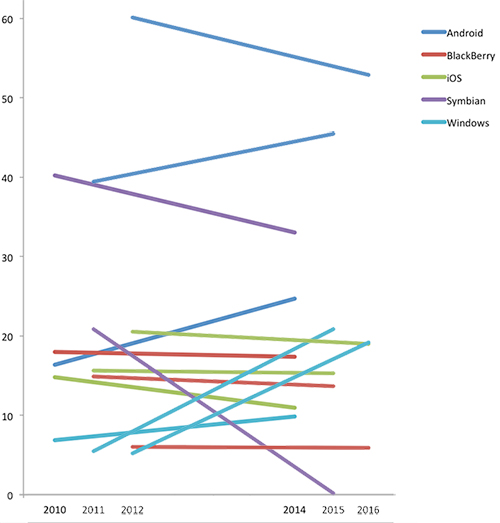
Research firm IDC has released its latest estimates of current market share for major smartphone operating systems, and its forecast for what the business will look like in 2016. The new data–which says that Android and iOS will go into decline while BlackBerry flatlines and Windows Phone booms — is getting lots of coverage, all of which treats it respectfully.
But when I read IDC’s projections, my instinctive response is the same as it always is when a research company makes these forecasts: How the heck would it know what’s going to happen to smartphones? How could anyone?
IDC makes its estimates on an ongoing basis; we always know its breakdown of current smartphone share and its forecast for four years from now. Judging from the past couple of years, the business is already changing in ways that IDC failed to anticipate. Its 2016 projections are sharply different from the ones it made in 2011 for 2015, which were a far cry from its 2010 projections for 2014. All of which leaves me deeply skeptical about the whole exercise.
To get a clearer sense of how IDC’s smartphone projections have shifted, I cobbled together an infographic showing the company’s stated market-share percentages for 2010, 2011 and 2012, and its projected percentages for 2014 (made in 2010), 2015 (made in 2011) and 2016 (made in 2012). Here’s what I came up with:
The most striking change involves Symbian:
- In 2010, IDC said that Symbian had 40.1 percent of the market, and would gracefully degrade to 32.9 percent in 2014.
- In 2011, it said that Symbian had 20.9 percent of the market, and would crater to .2 percent in 2015.
- In 2012, it didn’t bother to break out Symbian at all.
Why did IDC fail to understand in 2010 that Symbian would essentially disappear, and quickly? Well, several reasons, but the biggest one is that the research firm wasn’t aware that Nokia would abandon the aging platform and bet everything on Windows Phone.
That’s the thing about smartphones: Startling, game-changing developments happen all the time. If you can’t assume that you even know what the big picture will look like a few years hence, you surely can’t predict market share down to the decimal point.
There’s no instance in which IDC’s assessment of the present and future of a particular platform has been consistent between 2010 and 2012:
- In 2010 and 2011, it thought Android would grow, but underestimated how rapid the clip would be. Now it’s forecasting that Andr0id has peaked.
- IDC keeps expecting iOS to start to decline–but instead, it’s still growing.
- It seems to assume slow erosion for BlackBerry OS, but its actual numbers show rapid shrinkage.
- It believes that Windows Phone will boom over the next few years even though its actual numbers don’t show it happening yet.
I don’t mean to bash IDC (which, full disclosure, is a division of IDG, my former employer). Other research companies such as iSuppli perform similar research, and I find their attempts just as pointless and just as likely to be wildly inaccurate in the long run. In this category, at least: If we were talking about something more stable, such as desktop PCs, it might be a different matter.
Oddly enough, IDC’s press release on its new forecast includes a quote from an analyst who does a good job of explaining why it’s so tough to have a sense of where the market is going:
“Underpinning the smartphone market is the constantly shifting OS landscape,” added Ramon Llamas, senior research analyst with IDC’s Mobile Phone Technology and Trends team. “Android will maintain leadership throughout our forecast, while others will gain more mobile operator partnerships (Apple) or currently find themselves in the midst of a major transition (BlackBerry and Windows Phone/Windows Mobile). What remains to be seen is how these different operating systems – as well as others – will define and shape the user experience beyond what we see today in order to attract new customers and encourage replacements.”
That’s right. We don’t know a thing about what any of these operating systems will be like in a few years. Without that knowledge, it’s impossible to have an informed opinion about how they’ll fare.
If a political pundit informed you that the Democratic ticket of Hillary Clinton and Andrew Cuomo would take the White House in 2016, beating the Republican duo of Chris Christie and Marco Rubio by 56.9 percent to 43.1 percent, you’d point out that we don’t even know which party will win the 2012 election. You’d probably mention that politicians’ stock can fluctuate quickly and wildly for completely unforeseen reasons. You might even say that it’s plausible that the person who’ll be elected president in 2016 isn’t even on anyone’s radar screen at the moment.
One thing you wouldn’t do is take such a prognostication seriously, no matter what the methodology was. Nor should we act like IDC, or anyone else, can accurately predict the future of smartphones.



